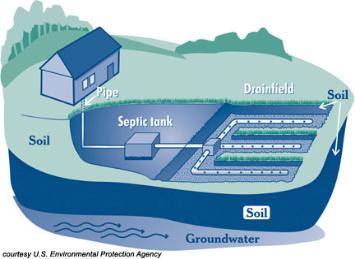
An oxidation pond or lagoon operates naturally using sunlight and wind movement to aerobically decompose sewage. The tight clay soils which prevent seepage fields from working properly are needed for this system to help retain the water long enough for good treatment. These ponds also discharge to the ground surface.
Advantages:
- Least expensive system to install
- Maintenance consists of mowing inside and outside banks of the pond
Disadvantages:
- Much larger area needed for construction; therefore would not be used in urban area
- Creates an attractive nuisance for children or pets
Do…
- Learn the location of your septic tank and waste pond. Keep a sketch of it handy with your maintenance record for service visits.
- Have your septic system inspected annually and pumped out regularly by a licensed contractor.
- Keep your septic tank cover accessible for inspections and pumpings. Install risers if necessary.
- Call a professional whenever you experience problems with your system, or if there are any signs of system failure.
- Keep a detailed record of repairs, pumpings, inspections, permits issued, and other maintenance activities.
- Conserve water to avoid overloading the system. Be sure to repair any leaky faucets or toilets.
- Divert other sources of water, like roof drains, house footing drains, and sump pumps, away from the septic system.
Don’t…
- Go down into a septic tank. Toxic gases are produced by the natural treatment processes in septic tanks and can kill in minutes. Extreme care should be taken when inspecting a septic tank, even when just looking in.
- Allow anyone to drive or park over any part of the system.
- Plant anything over or near the drainfield except grass. Roots from nearby trees or shrubs may clog and damage the drain lines.
- Allow tree limbs to shade the waste pond. It is very important for sunlight to reach the surface of the pond. Sunlight is what treats the waste; if there is no sunlight, then there will be no treatment and untreated sewage would be discharged onto the ground surface.
- Allow vegetation to grow to or above the water surface of the waste pond.
- Allow weeds and other tall vegetation to grow on the sloped areas around the pond. This could prevent sunlight from reaching the water surface. Make sure grass is planted on this surface and maintained.
- Make or allow repairs to your septic system without obtaining the required health department permit. Use professional licensed septic contractors when needed.
- Use septic tank additives. These products usually do not help and some may even be harmful to your system.
- Use your toilet as a trash can or poison your septic system by pouring harmful chemicals and cleansers down the drain.
